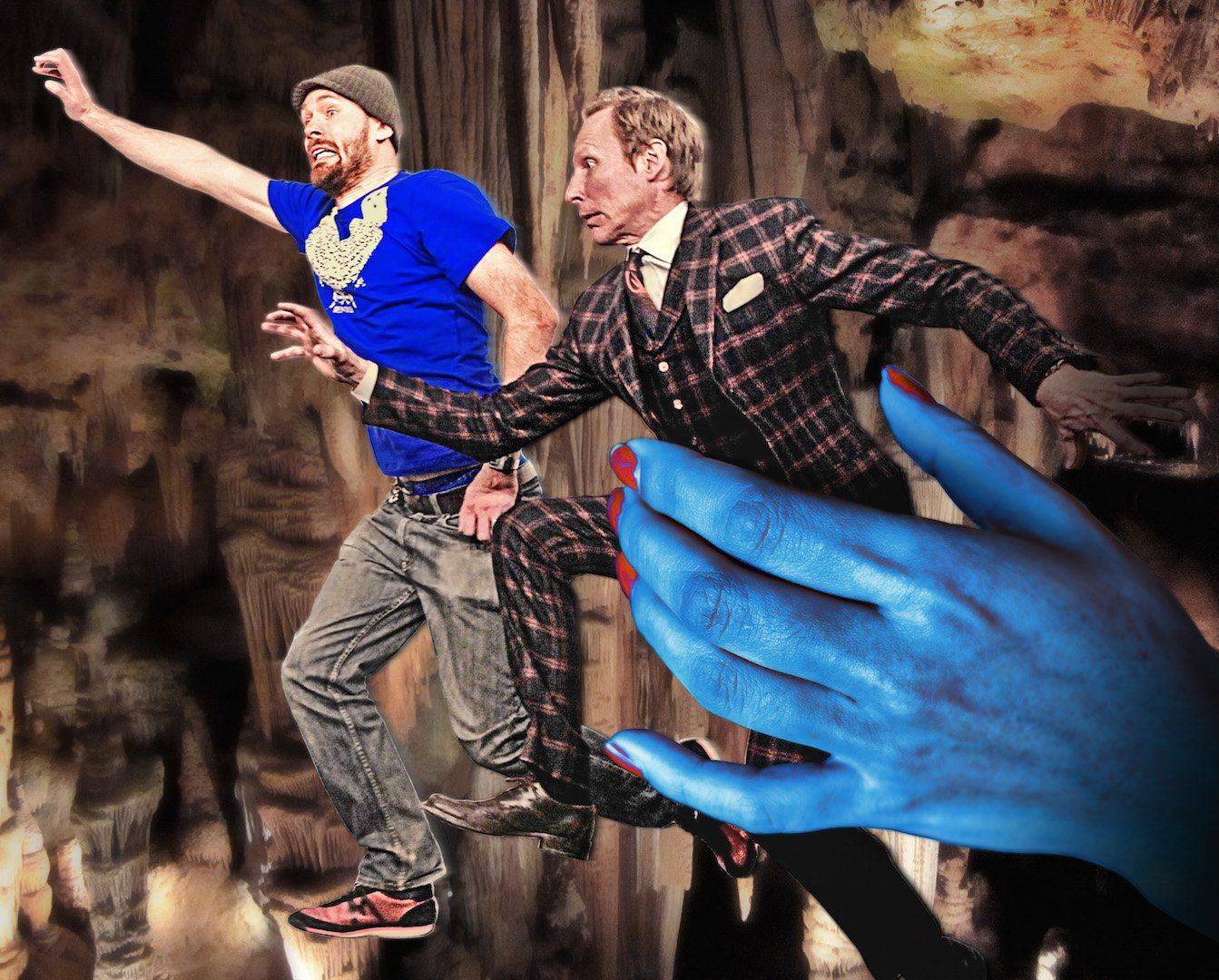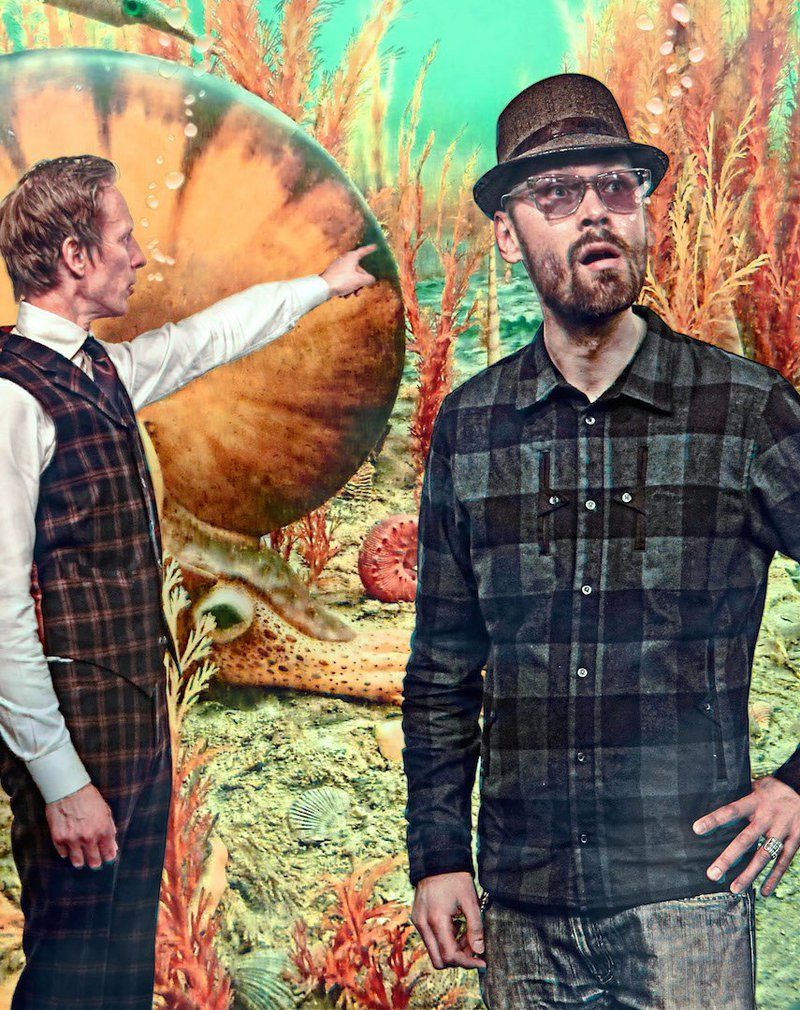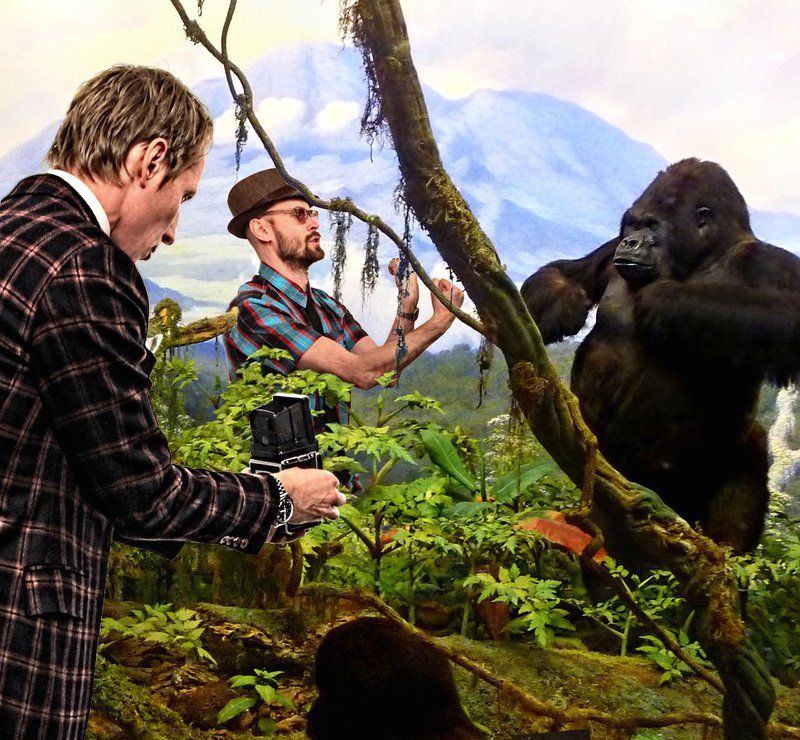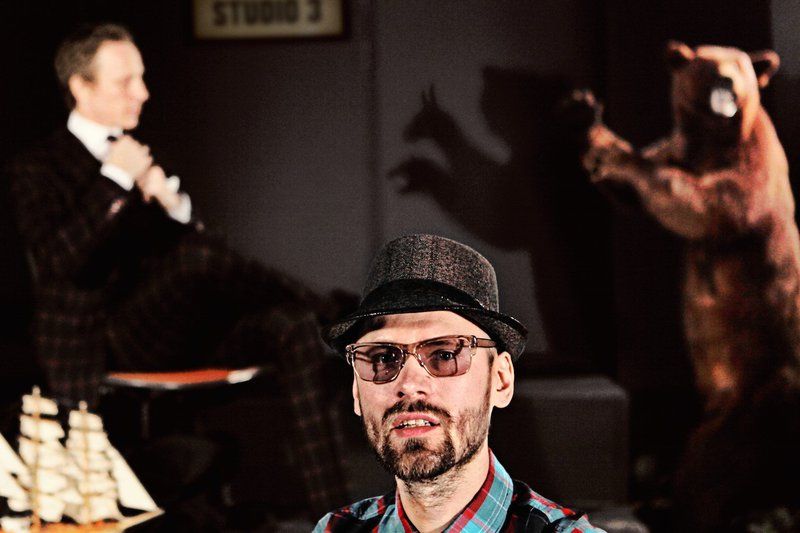
Be In A Great Shape!
A constant drive to try new things.
James Spectrum
Jari Salo - or James Spectrum as fans might more readily know him - is one half of the offbeat Finnish electronic music sensation Pepe Deluxé, who have been pushing boundaries with their own distinctive music and remixing for other artists since the late 90s, and are still going strong. From sampling to Psychedelia, Tom Jones to Angry Birds, Spectrum talks about his constant drive to try new things, what’s kept him in the game, and the gear that’s featured along the way.
How did your fascination with music start? How did it all kick off?
I kind of started really late…I was taken to a huge rock concert [in 1987], I think it was called ‘Giants of Rock’, which had lots of heavy metal bands. The main performer was Dio, and his guitar player Craig Goldy was such a cool character I was totally star-struck and realized I wanted to be a musician too. Unfortunately, my friend was already playing guitar, so I had to take bass guitar. So that was my humble beginning. I spent most of my teenage years practicing scales and lots of music stuff, but I never became a really good bass player because my teacher was a guitar player who wanted to be the fastest guy in the world! It was the era of neoclassical metal, started by Yngwie Malmsteen. I was like 68 times a day practicing scales, that kind of thing, that’s dreadful stuff for a bass player!
Luckily we’ve got the army thing here [compulsory Finnish military service at 18]; after the army, I quit playing bass, and that’s when techno arrived. I went to the parties for a little while and then realized this music was so simple even I must be able to make it! Then I got my first sampler and a few synthesizers and that was I think the true beginning, that’s how I got into the production side of things.
I was completely dreadful at making techno because all my ideas were too weird and too complex; luckily a few years later trip-hop happened and things started getting really crazy sound-wise, and that’s how I found my voice.
It also helped to have the bass player background because from there I had the musical theory, and I knew how not to play bass. I think with programming and with the samples, I went back to bass but this time doing it how it should be done.”
So, it was 1996 when Pepe Deluxé was formed?
Yes. It was the strangest process because we first had a record deal, then we had members, then we had a tune - Call Me Goldfinger - and only then did we actually realize we wanted to start a band. Our original member DJ Slow got a deal from Bomb records from L.A, they wanted to have his scratch tune on the second Return of the DJ compilation…

And once Spare Time Machine had been released in 2007 you thought sampling wasn’t what you were about and you started getting into Psychedelia and Baroque Pop and stuff?
Yeah, it was a big thing because we started with samples and then I realized at some point I was more interested in recreating sounds of the past and working with musicians. But luckily because we started with samples we had all these references as to how things should sound. Spare Time Machine is the first album we did with zero samples. I’m so happy with all the reviews and especially the ones that mention the numerous samples that we used because there aren’t any… that’s an achievement! And that’s still an essential part of my sound; I try to create sounds that have a vibe of being taken from a record.
Let’s talk about gear. It sounds like you’ve had a really eclectic journey with both traditional approaches and sampling; what kind of gear has really given you focus in your music?
Of course in the beginning it was the Ensoniq ASR-10 sampler. With two of them and just a few effects processors, we actually did the first two albums, with just samplers. There are still quite a few hip-hop guys who are still using the sampler just as an instrument. They take something from a record, tweak the sound, play it on audio works desk…they don’t even save the sound, they just use it as an instrument.
More recently, I have to mention the Drum Leveler because it was something I didn’t know about, something I didn’t desire, but when I got it I realized that this is the tool I’ve been looking for the last 5, 10 years. It has completely replaced a long chain of plug-ins in my typical drum processing setup. What I do with drums is really post-production; instead of trying to make them sound natural, I almost always go for the "sampled beats" vibe. Naturally, the key drums are snare and kick. With Drum Leveler I can totally isolate those sounds and make them rock solid if I want. Then I process them with various tools and use these "sample drums" in parallel with drum tracks that are often fiercely compressed. This way I can get all the energy and enhanced details of real drums, get some really mad Joe Meek-style pumping compression going on, yet the drums stay very solid and punchy.
But the name of the plug-in can be a bit misleading - it's great for any kinds of intelligent dynamics control and enhancement. For example, I just mixed a tune where the main guitar track had a nice tremolo effect, but I felt the tremolo should have been deeper and a bit angrier. So I created a parallel guitar track where I adjusted Drum Leveler to keep just the loud "on" parts of the tremolo. Then I saturated that a bit, added some bass to get more of that “woof woof” sound of a loud tremolo, added some speaker resonance distortion - that's my own design analog effect - and mixed the resulting track with the original guitar. The guitarist was very happy: the guitar went from quiet and tiny to big and mean.

Apart from that, there hasn’t been one stand-out piece of gear. I have way too many toys and many of them are rare, customized, or plain bizarre. With all records it’s all the aspects, starting from the composition, into the actual sound of the recording - what happens when it’s recorded on tape and then mastered for vinyl, then the vinyl sound when it’s played back. It’s all the sounds after the performance that’s been inspiring to me. I’m still going for that as the main creative, using the sound from records of the 40s to the early 70s as a starting point but combining them in unusual ways to create something new. I’m really not interested in creating music that’s competing with the past but taking ideas from there…sort of doing the music from the 50s to the 70s but from another dimension.
So really you’re not recording music as the ‘end result’, you’re recording it with a view to re-hashing it further, almost set out to create an original sample?
That’s exactly it, you’ve hit the nail on the head. It’s exactly the process of creating samples and having that approach. Of course, it really helps to have a colleague like Paul Malmström, he’s a really super cool traditional composer who can create and re-create anything. If I want a 60s Japanese “Eleki” surf guitar solo, he’ll deliver the right notes and the right sounds. I’d also say that one of our secrets is there are lots of things that we’ve recorded without any sort of master tape. I’ll have a rough backing track but I’ll be recording things on a C cassette 4-track, then maybe two months later transfer the recordings to a work station, then be editing; really using the recording as a sample.
Do you have a workflow that you follow or do you change it each time as you go along?
It would be wonderful to have some sort of formula! We had the hit formula with the first album and we even scored one hit, but I’ve lost it! Now I think I’m re-inventing things every time. Actually, If I don’t re-invent every time I get really easily bored. For the creative process it’s important to keep yourself on the edge a little bit by changing things; stay out of your comfort zone. I jump from C cassette 4 recording to recording with Zooms - little hand-held things - then I might be processing that with old reel-to-reel or perhaps a wire recorder… so I really try and work with different technologies, different approaches and different ways of creating the sounds. Right now I’m super interested in Victorian and Edwardian era electronics and sound processing tools.
Is it boredom, or is it a sense of being a mad professor experimenting with music, or is it a bit of both?
I think it’s a bit of both. It’s wonderful when you have a sort of routine so you can rely on that. Especially if I work with other artists when I help with their production and mixing. Sometimes it’s good when you have strict deadlines and you know how things work. But when I think about Pepe it sounds really wrong if I say it’s work, because it’s really a lifestyle. The older I get the more important it becomes the drive to keep me changing things because you don’t want to play the same game again and again. It’s not really about the end product, it’s more about the traditional thing they say, that the journey is more important than the destination.

In the area of music you play in and work in, longevity isn’t really that common, but you’ve been around for 20 years now. What do you think has kept you going and kept you in the public eye?
I think the main thing that keeps us going is that we always change things and always invent new things. Especially with Paul, he’s such a great writer. Being a Swede, of course, coming from the land of Abba, he’s a wonderful pop writer - there’s all these catchy themes and hooks. It’s easy to do crazy experimental music, but crazy and catchy is a lot more difficult. Everyone loves to label things but with our music, it’s really difficult because even the tunes might change from one style to another style in the middle, and there might be something like seven different parts. There are even some minimalistic Pepe Deluxé tunes.
There aren’t any formulas or any ways... it’s more like we try to sort of ideological things. Right now we’re working on a tune that’s taking the idea of the old saying that ‘architecture is frozen music. So we’re trying to do it the other way, trying to create a building that was never built: called “Kalevalatalo” (Kalevala House), it was going to be the largest culture and art research centre in the world. There was even going to be a crypt for Finnish heroes and great men and women deep under the building. Wonderfully crazy stuff, very North Korea. The building was designed by a famous Finnish architect, Eliel Saarinen, and surprisingly he never got to actually build it, so we are trying to create a tune that’s a musical representation of the building.
Things can get really complicated and also super fun. Sometimes we go into super small details that none of the listeners ever hear. Which kind of explains why we only release one record every 4 or 5 years because sometimes one tune can take two years of work - of course, it’s not all the time working on one tune, but developing ideas and adding them…luckily - or perhaps, unfortunately - we have a very understanding record company!
Let’s talk about collaboration. You’ve done some pretty big remixes, working with people like Tom Jones, The Cardigans, Eminem. What do you think people are coming to Pepe Deluxé for when they ask you for a remix?
I think it’s really that people have loved our sound and the recordings we’ve done, and even though we always change the details of the tunes, and even the styles, there’s always a certain type of Pepe Deluxé sound. It’s always sort of timeless. Our first and only hit Before You Leave, was released in 1998, and just 2 or 3 years ago it was used in the French presidential campaign - it’s been used every 2 or 3 years on something. It’s funny because it’s a tune that’s taken samples from the 60s and 70s but still manages somehow to be pretty timeless.
Lately, we’ve refused most remixes because at some point it got a little bit boring. Most of them were done in the late 90s and early 2000s when the remix culture was really alive. We went to a traditional way of recording, and after a while, I felt I didn’t want to do it.

Your work is very eclectic – you’ve done everything from a project with Ron Jeremy to the music for Angry Birds! It’s almost like you don’t want anyone to put you in a box. Is it a conscious decision to make sure you don’t get pigeon-holed?
Not really, it’s more like a boyish dream of being able to do fantastic adventures all the time! It would be dreadful if I was forced to concentrate on just one type of music. I like all kinds of music, but to keep the creative flame burning I need to be changing things all the time, so there’s always something new happening and new ideas. It’s really about learning; every time you start doing something new you always learn things and then you add that knowledge to your old stuff and apply it to a different type of music and different ideas. Sometimes they don’t work but sometimes you can create real progress in music. It’s like baby steps; even if you can take a really small step forward it’s something you can really celebrate.
How did you get to do the music for Angry Birds, how did that come about?
It was a really fun job! I was going to the meeting about to say no, but the music people in the company were really nice… A friend of ours started working for them quite a few years ago, and he asked if we would be interested. We weren’t sure but when we went to see the Angry Birds music guys they basically gave us total freedom. We had this idea that instead of making the usual computer game music we could use real instruments and real musicians, and do a sort of hybrid thing. They gave us total freedom – and a really limited budget! I went recording lots of really unusual instruments for the project…. I played with gardening tools, I went to Stockholm Music Museum, I recruited Yngwie Malmsteen’s ex-keyboard player Jens Johansson because of my teenage metal background. That was a dream come true; Jens is such a wonderfully crazy gentleman. Also Kimmo Pohjonen, the accordion player whose album is now number 1 on the World Music Chart. I recruited him for the project because I was producing his album at the same time. Lots of lots of cool players. It was a very fun project, especially being able to do some straightforward groovy music. Lately, the Pepe stuff has been going more and more into doing complex things - still the groove thing but with 3, 4, 5 parts. It was nice to do this minute and a half of party tunes!
Finally, if you could go back to the 16-year-old Jari, what piece of advice would you give him now you’ve gone through the journey?
I’d say eat well, sleep well and exercise! It's easy to do 10-15 hour session days when you're 20. But if you have a long career, you gotta be able to do that when you're 30. And 40. And 50. Etcetera. And if you're the one doing production, you're always the first to arrive and the last to leave. You better be in a great shape!
Everything else is all about trusting your creativity and having fun, and if you have tons and tons of luck something might happen. And if things do happen: Never forget to share the credit and possible income with those who deserve it!